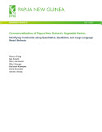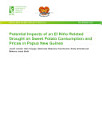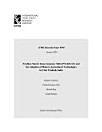Declining purchasing power of minimum wages in Papua New Guinea: Analysis of economic access to healthy diets
Mahrt, Kristi · Schmidt, Emily · Hayoge, Glen
Jul 2025 · Papua New Guinea Project Note Book 20 · Intl Food Policy Res Inst
Ebook
13
Pages
family_home
Eligible
info
reportRatings and reviews aren’t verified Learn More
About this ebook
Key Messages To address rising living costs which reduce the purchasing power of the minimum wage, the Government of PNG recently launched a review of the country’s minimum wage. The minimum wage has been PGK 3.50 per hour or PGK 28 per 8-hour day since July 2016. At the beginning of 2025, the minimum wage could purchase about three-quarters as much food and other goods and services compared to July 2016. The cost of a healthy diet per adult per day in urban areas increased by 35 percent from PGK 7.70 in 2021 to PGK 10.37 in 2025. The cost of the healthy diet was the most expensive in Port Moresby—PGK 11.15 per adult per day in 2025 and increased the most in Kokopo (54 percent) from PGK 5.81 to PGK 8.92 between 2021 and 2025. One and a half full-time urban minimum wage earners earn just enough to feed a healthy diet to a family of five in 2025, with no money remaining for essential non-food expenses such as clothing, shelter, transportation, health, and education. The government recently published a public notice of Goods and Services Tax (GST) zero-rating of essential goods effective 1st June 2025 to 30th June 2026. We re-evaluate the purchasing power of a minimum wage by decreasing the price of tinned tuna and rice by 10% (reflective of the GST zero-rating) on Q1 2025 recorded prices. Assuming prices remain constant (with no shifts in demand due to decreased tax), the cost of the average urban healthy diet in the first quarter of 2025 is 4.7 percent lower without the GST (PGK 9.87) compared to the cost of a healthy diet with the GST (PGK 10.35) — slightly improving the purchasing power of minimum wage earners.
Rate this ebook
Tell us what you think.
Reading information
Smartphones and tablets
Install the Google Play Books app for Android and iPad/iPhone. It syncs automatically with your account and allows you to read online or offline wherever you are.
Laptops and computers
You can listen to audiobooks purchased on Google Play using your computer's web browser.
eReaders and other devices
To read on e-ink devices like Kobo eReaders, you'll need to download a file and transfer it to your device. Follow the detailed Help Center instructions to transfer the files to supported eReaders.










